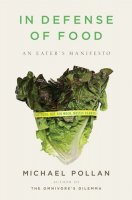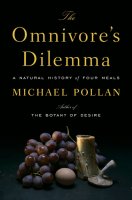 In Defense of Food: An Eater's Manifesto, by Michael Pollan (Penguin, New York, 2008)
In Defense of Food: An Eater's Manifesto, by Michael Pollan (Penguin, New York, 2008)
I'm in the middle (okay, the beginning) of two rather hefty books at the moment, Susan Wise Bauer's The History of the Ancient World, and my latest review book from Thomas Nelson, The Chronological Guide to the Bible. It's great to be reading the two of them together, though that means it will be a long time before I can review either one.
And now longer still, as the library e-mailed to let me know that I'd made it to the top of the waiting list for In Defense of Food. Michael Pollan is shaping up to be the next John Taylor Gatto for me: a modern author whose books I simply can't resist and can't put down. Reading was the easy part; reviewing without quoting from every page is the difficulty. The book is bristling with my neon green and pink sticky notes. (More)
 The Omnivore's Dilemma: A Natural History of Four Meals, by Michael Pollan (Penguin, New York, 2006)
The Omnivore's Dilemma: A Natural History of Four Meals, by Michael Pollan (Penguin, New York, 2006)
My limited knowledge of Michael Pollan prior to devouring this book was primarily his mantra for healthy eating: Eat food. Not too much. Mostly plants. There's a lot of wisdom there — not that I'm very good at following it — but that phrase itself is not found in The Omnivore's Dilemma. It is the beginning, however, of an excellent Pollan article in the New York Times, Unhappy Meals.
I'll admit I was expecting a diatribe, a full-force blast against agri-business and the factory farm, more along the lines of what we hear from the more strident vegans and animal rights activists. Pollan, however, is much too skilled as a journalist and writer for that. If his journeys lead him to both Food Hell and Food Heaven, they also show him that there is no clear, simple, and easy path to salvation when it comes to eating. (More)
Most of you can stop reading right now. The Pap smear is not a subject of general interest, but I spent five years working in a cytopathology automation research laboratory, part of an attempt to make the reading of Pap smears easier and more accurate. Thus the following headline was sure to catch my eye: Should HPV Test Replace the Pap Smear?
The primary purpose of the Pap smear is the early detection of cervical cancer, it is argued, but testing for human papillomavirus is easier and actually does a better job, although it generates more false positives, especially in younger women.
What I find most interesting is the unmentioned, but logical implication that those who are at no risk of contracting HPV, due to the simple expediencies of virginity or faithful monogamy, can dispense with both tests—surely a course of action the medical industry would not wish to endorse! Gastroenterologists have adopted a once-every-ten-year colonoscopy recommendation for low-risk patients, perhaps gynecologists should follow their example.[This] recommendation is based on a study that found that the human papillomavirus (HPV) test prevented more cases of cervical cancer than the conventional Pap smear. Results of the study were published online Jan. 19 in The Lancet Oncology.
The HPV test should become the screening tool of choice for women 35 and older, the researchers said. It could be done less frequently than the Pap test, which could be used only in women who have tested positive for HPV, they said.
 Born to Run, by Christopher McDougall (Knopf, New York, 2009)
Born to Run, by Christopher McDougall (Knopf, New York, 2009)
A book about running? Not my thing. On my daily walks (where by "daily" I mean five days a week and only when I'm not on the road) I've managed to work my way up to doing a quarter of my four miles at what could charitably be called a slow jog, but there my interest ended. However, my nephew received Born to Run for Christmas, and I was curious enough to flip quickly through it.
Born to Run is a fascinating and groundbreaking book. Actually, it's at least three books, interwoven, and it's no coincidence that when I perused it I couldn't decide if it was meant to be nonfiction or a novel. (More)More from the backblog . . .
The Strange Double Standards of Abortion John Stackhouse muses on the murder of abortion doctor George Tiller, vigilantism, and hypocrisy. (More)Despite my efforts, my backblog appears to be growing faster than I can deal with it. Here's a quick look at several interesting health-related issues that have come my way recently. (Where "recently" is defined as "sometime within the last year or two"; that's how old some of my backblog is.)
Acknowledging Preindustrial Patterns of Sleep May Revolutionize Approach to Sleep Dysfunction Do you worry when you awaken in the middle of the night and can't get back to sleep? Your body may be rebelling against unnatural sleep patterns imposed by artificial lighting and our frantic schedules. (More)President Obama has declared the swine flu outbreak to be a national emergency. I'm not sure that's all that bad of a measure, given that it lifts some governmental rules for hospitals that probably weren't a good idea in the first place. But as Susan McWilliams points out in this Front Porch Republic post, our media-hyped fears seem 'way out of line. It's hard not to quote her entire post.
(More)What Thucydides helps us to see [in his description of a plague in Athens during the Pelopponesian War], as George Kateb has written, is “the ways in which fear of death through contagion disorganizes all human relations”:
It is the peculiar power of contagious disease to isolate people from each other; normal communal ties give way before the desire of every man to avoid contact which could bring on the disease and with it, death. The wish to remain free of sickness overrides all duty and all affection.
The plague resulted in what Kateb calls “a kind of negative state of nature: instead of the war of all against all, there was the avoidance of all by all.” What is ultimately most horrifying about the plague is how it exposes the fragility of civilization. You might not be able to build Rome in a day, but you can destroy Athens in a few weeks.
As a child, I always had trouble cleaning my room. What should have been a 10-minute exercise turned into an all-day project, because of course the most important part of cleaning my room was reorganizing the bookshelves, and a book, once in my hand, demanded to be read.
Tonight, trying to get my office in order, and with no time to spare for distractions, I came upon the paperwork I received along with my seasonal flu shot.
Plus ça change: Twenty minutes later, I finally tossed the papers in the trash, and will be back to work as soon as I've posted this—meaning what should have taken half a second to deal with will have eaten up about 40 minutes. I was inspired to try to find out where the vaccine had been manufactured, hoping it was in some country whose quality control I thought I could trust, i.e. not China. The information is surprisingly hard to discover. Although the papers were covered with remarkably fine print, I could see no point of origin. "Manufactured by..." does not necessarily indicate where. Once I found out the names of the company and of the vaccine, however, I could do an Internet search.
Not that that helped, except negatively: there was at least no evidence that the manufacturing facilities were in China. I must also say that the name of the company itself was reassuring: Novartis. For no good reason, I must admit—but anything from Basel must be reliable, right?Until recently, Cairo had a refuse-collection system unlike any you'll find in the United States, but it worked—and might even be commended for its efficiency and environmental responsibility. Cairo's households enjoyed free or inexpensive garbage collection, right from the door, by the zabaleen ("garbage people"), an impoverished community of Egyptian Christians living in an area of Cairo known as "Garbage City." The collectors and their families then sorted the trash, reusing, repairing, and recycling what they could, and feeding the organic waste to their livestock, primarily pigs.
Sanitation workers do not generally enjoy high status anywhere, and the zabaleen are despised not only for their jobs, but also for their poverty, their religion, and their willingness to keep pigs as livestock. However, as even American cities discover during a protracted sanitation strike, we do not do well to devalue other human beings, least of all those responsible for keeping us from suffocating in trash.
In a misguided effort to stave off a swine flu epidemic, Egypt ordered that all the pigs be killed, even though the disease is not, in fact, spread by pigs. By the law of unintended consequences, Cairo's citizens are now more vulnerable to disease than before. The zabaleen no longer collect the trash, and the government's effort to replace them with multinational corporations has largely failed. The poorest of the poor have lost their only livelihood as well as their source of food, and Cairo's streets overflow with filth.
I don't write this to belittle Egypt or the Egyptian government, but as a warning. Our country has a problem: Our healthcare system, once arguably the best in the world, is falling apart. (We can disagree over the causes, or even the definition, of "falling apart," but that's not the point here.) There's no shortage of wrangling over what the intended consequences of a federally-imposed health plan might be, but whatever shakes out of that debate, I fervently hope that we will consider the possible unintended consequences before killing off the pigs.
(Sources used for this post included The New York Times and Wikipedia.)My Swiss family doesn't let me forget that "universal health care" does not necessarily mean a system like that in the United Kingdom. For this I am grateful, because of the horror stories that keep emerging from that system, such as the cases of Charlotte Wyatt, Leslie Burke, Linda O'Boyle, Jayden Capewell, and too many others to write about. It's worth looking at alternatives, and T. R. Reid's The Healing of America does just that.
I haven't read the book; my opinion is based on the New York Times review. There's much I don't agree with in the review, and I'm sure in the book also, but I like the gimmick: Reid had shoulder problems that were interfering with his golf game, and he decided to present the case to 10 different doctors around the world. The results? (More)It would not be too strong to say that I loathe politics. I vote, and have done so since I was first able to at age 19, but mostly without enthusiasm; choosing the least objectionable candidate is gritty, unsatisfactory work. Other than that, I try to ignore politics. Unfortunately, politics does not return the favor, so I occasionally give in to the prodding of my conscience and attempt to articulate a political opinion in a blog post, or write a letter to an elected official, or attend a political meeting.
The last is rare indeed, but that's what I did the other night. Our state representative held a health care "town hall meeting." On my list of preferred activities it was somewhat below scrubbing the bathroom floor with a toothbrush, but I put on my Sunday-go-to-meeting clothes and ventured out into the rain anyway. Not without a bit of grumbling under my breath, but this was one of the few candidates in memory who actually impressed me in his campaign—or maybe credit goes to the campaign worker who rang my doorbell; those of you who know me know that it takes someone really special to impress me after starting out on such a wrong foot! Anyway, I decided to go because I can't very well complain about what they're doing to health care if I don't express my opinion, and because I think our representative is a good guy and what a shame it would be if he held a meeting to get people's opinions and no one showed up. I thought I'd at least go and say hi and maybe get to know him better. (More) Chocolate Unwrapped: The Surprising Health Benefits of America's Favorite Passion, by Rowan Jacobsen (Invisible Cities Press, Montpelier, Vermont, 2003)
Chocolate Unwrapped: The Surprising Health Benefits of America's Favorite Passion, by Rowan Jacobsen (Invisible Cities Press, Montpelier, Vermont, 2003)
Like chocolate, this delicious book goes down easily, and the facts about chocolate's health benefits are not hard to swallow. At a mere 126 pages from introduction through references, it's a quick and easy read—I read most of it on the way to and from church today—and yet manages to cover the history and production of chocolate, a good deal of detail on why chocolate—which begins as a fruit, after all—should be considered a health food, environmental and labor issues in the production of chocolate, unusual chocolate recipes, and list of great chocolate sources. It is necessary to ignore a few insults to Columbus, the Puritans, and anyone who likes milk chocolate, but on the whole these are minor annoyances. (More)
I'm thinking of moving to Canada, and it has nothing to do with avoiding the draft, nor with frustrations over our current political direction, nor because of the recent heat wave in which our near-100-degree daytime temperatures "cooled down" all the way to 85 in the middle of the night—and not even because Canada ranks close to Switzerland and New Zealand at the top of my list of the world's most beautiful places. No, what makes being Canadian particularly attractive at the moment is this study of the relationship between body mass index and death of more than 10,000 Canadian adults.
Researchers found that while underweight and extremely obese people die earlier than people of a normal weight, people who are slightly overweight actually live longer than those of a normal weight.
[U]nderweight people were 70 percent more likely than people of normal weight to die, and extremely obese people were 36 percent more likely to die. But overweight individuals were 17 percent less likely to die. The relative risk for obese people was nearly the same as for people of normal weight.
[T]his was the first large Canadian study to show that people who are overweight may actually live longer than those of normal weight.
But wait...there's good news...I may not have to move after all:
Gotta love medical studies. You can find one that proves whatever you want. Now to get my hands on a copy of Chocolate Unwrapped: The Surprising Heath Benefits of America's Favorite Passion.An earlier study, conducted in the United States and published in 2005 in the Journal of the American Medical Association, showed similar results.
A friend alerted me to an article on midwives from the May 20, 2009 Orlando Sentinel. It's about a recently-developed program of the Orange County Health Department that provides hospital-based midwife services for low-income women in the Orlando area, and told me some things I didn't know about midwives and Florida law.
Knowing from experience that links to Sentinel articles break after a while, I'll provide a few relevant excerpts below. (More)
Daniel Hauser, a 13-year-old boy with cancer, is being forced to receive treatment that both he and his parents have refused.
I often find myself in the minority when I argue for parental rights. Doctors, teachers, social workers, and "concerned citizens" fret over the idea that parents should be allowed to make decisions that they believe are not in the bests interests of their children. In one sense it's hard to blame them, as these are often people who are in a position to see better than most the consequences of physical, emotional, and educational neglect and abuse. (More)"It is imperative that Daniel receive the attention of an oncologist as soon as possible," wrote Brown County District Judge John R. Rodenberg in an order to "apprehend and detain....His best interests require it."


